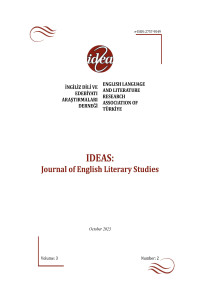Öz
For the Mercy of Water is the story of a writer travelling to an unnamed, abandoned countryside, in an imagined Global Southern country, to interview an old woman identified as “Mother” after the murder of the young girls by the water security guards of “the company.” I examine For the Mercy of Water’s representation of exploited, marginal rural space as a ‘ruinscape’ that manifests the palimpsestic overlay between linear time, industrial time, colonialism, and neoliberal globalization. I use the term “ruinscape” in the literary imagination, not as imagery of damaged space, but as spatial representation of the negative social, economic, and environmental processes across historical periods that interpenetrate each other. I argue that the novel also presents an emergence of new potentialities by counter-hegemonic temporalities that reconceptualize the present moment as an ongoing accumulation of time and space, rather than a linear organization of resources.
Anahtar Kelimeler
21st Century South African novel temporalities neoliberal globalization water wars ruinscape
Kaynakça
- Adam, Barbara. Time. Polity, 2004.
- Barber, Pauline Gardiner. “The Entanglements of Neoliberal Temporalities and Class Politics in Philippine Migration to Canada.” Migration, Temporality, and Capitalism: Entangled Mobilities Across Global Spaces, edited by Barber and Winnie Lem, Springer International, 2018, pp. 161–184. doi:10.1007/978-3-319-72781-3_9.
- Bragg, Elizabeth A. “Towards Ecological Self: Deep Ecology Meets Constructionist Self-Theory.” Journal of Environmental Psychology, vol. 16, no. 2, 1996, pp. 93–108. doi:10.1006/jevp.1996.0008.
- Dawney, Leila. “The Multiple Temporalities of Infrastructure: Atomic Cities and the Memory of Lost Futures.” Environment and Planning D: Society and Space, vol. 39, no. 3, 2021, pp. 405–422. doi:10.1177/02637758211013037.
- Eatough, Matthew. “Futures, Inc.: Fiction and Intellectual Property in the (South) African Renaissance.” World Literature, Neoliberalism, and the Culture of Discontent, edited by Sharae Deckard and Stephen Shapiro, Springer International, 2019, pp. 215–237.
- Fabian, Johannes. Time and the Other: How Anthropology Makes Its Object. Columbia UP, 2014.
- Ferguson, James. Global Shadows: Africa in the Neoliberal World Order. Duke UP, 2006.
- Haraway, Donna J. Staying with the Trouble: Making Kin in the Chthulucene. Duke UP, 2016.
- Harris, Ashleigh. Afropolitanism and the Novel: De-Realizing Africa. Taylor & Francis, 2019.
- Jayes, Karen. For the Mercy of Water. Penguin Books South Africa, 2012.
- Kundnani, Arun. “The Racial Constitution of Neoliberalism.” Race & Class, vol. 63, no. 1, 2021, pp. 51–69. doi:10.1177/03063968219927.
- Latour, Bruno. “Agency at the Time of the Anthropocene.” New Literary History, vol. 45, no. 1, 2014, pp. 1–18.
- Moore, Jason W. “The Capitalocene, Part I: On the Nature and Origins of Our Ecological Crisis.” The Journal of Peasant Studies, vol. 44, no. 3, 2017, pp. 594–630. doi:10.1080/03066150.2016.1235036.
- Naess, Arne. There Is No Point of No Return. Penguin Books Limited, 2021.
- Nixon, Rob. Slow Violence and the Environmentalism of the Poor. Harvard UP, 2011.
- Stoler, Ann Laura. Imperial Debris: On Ruins and Ruination. Duke UP, 2013.
- West-Pavlov, Russell. Temporalities. Routledge, 2013
Öz
Kaynakça
- Adam, Barbara. Time. Polity, 2004.
- Barber, Pauline Gardiner. “The Entanglements of Neoliberal Temporalities and Class Politics in Philippine Migration to Canada.” Migration, Temporality, and Capitalism: Entangled Mobilities Across Global Spaces, edited by Barber and Winnie Lem, Springer International, 2018, pp. 161–184. doi:10.1007/978-3-319-72781-3_9.
- Bragg, Elizabeth A. “Towards Ecological Self: Deep Ecology Meets Constructionist Self-Theory.” Journal of Environmental Psychology, vol. 16, no. 2, 1996, pp. 93–108. doi:10.1006/jevp.1996.0008.
- Dawney, Leila. “The Multiple Temporalities of Infrastructure: Atomic Cities and the Memory of Lost Futures.” Environment and Planning D: Society and Space, vol. 39, no. 3, 2021, pp. 405–422. doi:10.1177/02637758211013037.
- Eatough, Matthew. “Futures, Inc.: Fiction and Intellectual Property in the (South) African Renaissance.” World Literature, Neoliberalism, and the Culture of Discontent, edited by Sharae Deckard and Stephen Shapiro, Springer International, 2019, pp. 215–237.
- Fabian, Johannes. Time and the Other: How Anthropology Makes Its Object. Columbia UP, 2014.
- Ferguson, James. Global Shadows: Africa in the Neoliberal World Order. Duke UP, 2006.
- Haraway, Donna J. Staying with the Trouble: Making Kin in the Chthulucene. Duke UP, 2016.
- Harris, Ashleigh. Afropolitanism and the Novel: De-Realizing Africa. Taylor & Francis, 2019.
- Jayes, Karen. For the Mercy of Water. Penguin Books South Africa, 2012.
- Kundnani, Arun. “The Racial Constitution of Neoliberalism.” Race & Class, vol. 63, no. 1, 2021, pp. 51–69. doi:10.1177/03063968219927.
- Latour, Bruno. “Agency at the Time of the Anthropocene.” New Literary History, vol. 45, no. 1, 2014, pp. 1–18.
- Moore, Jason W. “The Capitalocene, Part I: On the Nature and Origins of Our Ecological Crisis.” The Journal of Peasant Studies, vol. 44, no. 3, 2017, pp. 594–630. doi:10.1080/03066150.2016.1235036.
- Naess, Arne. There Is No Point of No Return. Penguin Books Limited, 2021.
- Nixon, Rob. Slow Violence and the Environmentalism of the Poor. Harvard UP, 2011.
- Stoler, Ann Laura. Imperial Debris: On Ruins and Ruination. Duke UP, 2013.
- West-Pavlov, Russell. Temporalities. Routledge, 2013
Ayrıntılar
| Birincil Dil | İngilizce |
|---|---|
| Konular | Ekoeleştiri, Sömürge Dönemi Sonrası Edebiyatı, Postkolonyal Çalışmalar |
| Bölüm | Research Articles |
| Yazarlar | |
| Erken Görünüm Tarihi | 31 Ekim 2023 |
| Yayımlanma Tarihi | 31 Ekim 2023 |
| Gönderilme Tarihi | 23 Ağustos 2023 |
| Yayımlandığı Sayı | Yıl 2023 Cilt: 3 Sayı: 2 |
IDEAS: Journal of English Literary Studies is published by The English Language and Literature Research Association of Türkiye (IDEA).

